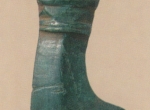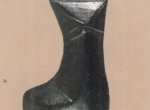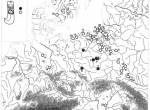Beak-shaped strap-end
Beak-shaped strap-end, usually made of bronze, mounted onto the end of a strap, in the form of a plate resembling a hook in outline, v-shaped or flat of cross-section (fig. 1-2.). Very often decorated with a design executed by engraving or stamping reminiscent of →Sösdala-Untersiebenbrunn Style.
A form typical for the late Roman Period (ca. 300/310-375 AD) and early →Migration Period (ca. 375-480 AD). The largest number of these strap-ends is recorded in →Wielbark Culture and in Dollkeim-Kovrovo Culture, they are also known from →Przeworsk Culture and from isolated finds from central and northern European →Barbaricum (map 1.). Mostly discovered in context with dress accessories, as strap-ends.
MP
Literature: A. Bitner-Wróblewska, From Samland to Rogaland. East-West connections in the Baltic basin during the Early Migration Period, Warszawa 2001; M.-J. Brather, Zwei bronzene Riemenzungen der Völkerwanderungszeit aus dem östlichen Brandenbrug, Jahrbuch für Bodendenkmalpflege in Mecklenburg-Vorpommern, t. 51, 2004, p. 375-396; B. Niezabitowska, Herulowie, [in:] A. Kokowski (ed.) Wandalowie – strażnicy bursztynowego szlaku, Lublin-Warszawa 2004, p. 271-274; R. Madyda-Legutko, Studia nad zróżnicowaniem metalowych części pasów w kulturze przeworskiej. Okucia końca pasa, Kraków 2011.
-
 pełna rozdzielczość
pełna rozdzielczość
Fig. 1. Selected beak-shaped strap-ends from the cemetery at Ulów, Tomaszów Lubelski distr. (B. Niezabitowska 2004).
-
 pełna rozdzielczość
pełna rozdzielczość
Fig. 2. Selected beak-shaped strap-ends from the cemetery at Ulów, Tomaszów Lubelski distr. (B. Niezabitowska 2004).
-
 pełna rozdzielczość
pełna rozdzielczość
Map 1. Distribution of beak-shaped strap-ends (R. Madyda-Legutko 2011).


